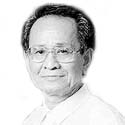
Vantage Point
By Luis V. Teodoro

The community pantry idea is apparently too complex for an uncaring officialdom obsessed with conspiracy theories to grasp. But it is actually a simple enough concept — and at the same time expressive of the tradition of bayanihan (communal spirit) of Filipinos’ helping each other in times of need.
Because millions are unemployed and their families destitute and hungry, why can’t the more fortunate make rice, vegetables, canned goods, noodles, even fish and meat and other foodstuff available for the asking by those who need them, and at the same allow those who want to help and can afford it to donate whatever resources they can spare?
This citizen’s initiative is one of the very few indicators during the current public health, governance, and economic crisis that there is still hope for the country of our sorrows. It was not the big bureaucrats of the current regime but ordinary people who wanted to help their less fortunate compatriots who not only thought of it, but also implemented it. In response, as others were inspired to replicate the project all over the Philippines, the government and its trolls condemned and demonized the men and women who had started it.
The police went around the communities, and in violation of the Data Privacy Act, began gathering information on the citizens who had set up community pantries. The military weighed in by surveilling them. Barangay tanod (watchmen) cited non-existent laws not only to put a stop to the pantries but also to prevent people from going to them for the food their families desperately need. Some of the hungry were even fined for supposedly being out of their homes during curfew hours.
The National Task Force to End Local Communist Armed Conflict not only admitted it was spying on community pantry organizers, it also tried to link them with the Communist Party of the Philippines and the New People’s Army and very likely circulated the pamphlets containing that claim. Its spokesperson went as far as to label the organizer of the first community pantry in Quezon City “Satan,” apparently without realizing that that charge could be properly leveled against those who prevent people from helping others rather than those who are devoting time, effort, and resources to feeding the hungry.
Not only individual lawyers but also the Integrated Bar of the Philippines and the Commission on Human Rights had to remind them that there is no basis in law for what they’re doing, and that rather than demonize the community pantry organizers, they should be welcomed and encouraged.
It did not occur to these worthies that their attempts to stop those citizens who care enough about their fellow Filipinos to do something about it are so patently outrageous that even some of the allies of the regime they serve, among them some senators, have been forced to acknowledge the good work those who organized and run community pantries are doing, and to condemn them for their puerile attempts to stop it. Apparently, however, they were doing so because they can’t stand the initiative’s implicit criticism of the government’s undeniably inadequate and disorganized response to the suffering of the millions of families whose breadwinners have lost their jobs, some of whom literally don’t know where their next meal is coming from.
The process of getting government aid (ayuda) and even the amount of it, for example, varies from LGU to LGU, and has been known to take several hours of waiting in line or even a day or two to accomplish. Other local government units (LGUs) dispense it in cash, and others in kind. The cash assistance also varies from P1,000 to P4,000. Asked what process is supposed to be followed by LGUs in dispensing aid, the Department of Interior and Local Governments (DILG) said it had left it to the LGUs to decide, apparently without realizing the chaos that could ensue as a result of that policy.
The same policy chaos is only too apparent in other areas, and not only in the government response to the community pantry phenomenon. About it the DILG and the Department of Justice say one thing, but barangay and police units do something else, even as the Department of Health and the Food and Drug Administration issue statements today on the vaccination program and the use of such drugs as Ivermectin only to contradict them tomorrow.
President Rodrigo Duterte himself has complained that his instructions are sometimes not being followed. Even his declaring that the West Philippine Sea “belongs” to China and that the government cannot do anything about it without going to war is contradicted by the Department of Foreign Affairs’ which has been protesting again and again about Chinese incursions in Philippine territorial waters.
What all these are suggesting is that no one seems to be in charge of either the government or the country. Everyone from department secretaries to common policemen and the lowliest barangay tanod do as they please, guided only by the implication in Mr. Duterte’s acts and statements that being in government makes one above the law, unaccountable and immune to prosecution. They also assume, as Mr. Duterte has repeatedly assured the police that they are free to use whatever means — including violence — to compel citizens to obey whatever requirement or regulation they concoct. As a consequence, any statement or declaration from their boss of bosses or from his coterie of yes-men that are contrary to these lawless precepts are regarded by anyone with even the pettiest power as meant only to delude and distract the public and need not be taken seriously.
These signs of State failure are all occurring during supposedly “Strongman” rule, which some Filipinos, who attribute to weak leaders the inability of past administrations to address the country’s legions of problems, approve of. Strong governments have indeed solved the problems of other countries and even led them to heights of progress and development. But it is not a matter of putting in office anyone whose rhetoric reeks with threats and profanities, but one who has a clear understanding of the country’s problems, what is wrong with the ways in which those are being addressed, if at all, and a corresponding program to solve them.
Such a program of government should be premised on the recognition that the active engagement of citizens in public matters can make a difference in the life of a nation, rather than consigning them to the role of victims and passive receptors of whatever government says and does. The validity of that assumption has again and again been proven by the experience of such other countries as the United States, the economy of which the labor and creative energies of immigrants developed, and China, which an awakened people transformed from “the sick man of Asia” into a global economic and political power in less than a hundred years.
The community pantry initiative is demonstrating how innovative the people can be in times of distress. It is helping families survive, while reminding everyone that they are responsible for each other, and that despite the social isolation imposed by the pandemic, still intact is a Filipino community that has survived not only foreign invasion and conquest and two world wars, but also the terrors of poverty and dictatorship.
Rather than celebrate and encourage it, however, the “Strongman” government is doing its all to frustrate it, to the detriment of the millions that need each other’s help in surviving the hardships of these troubled times.
Luis V. Teodoro is on Facebook and Twitter (@luisteodoro).